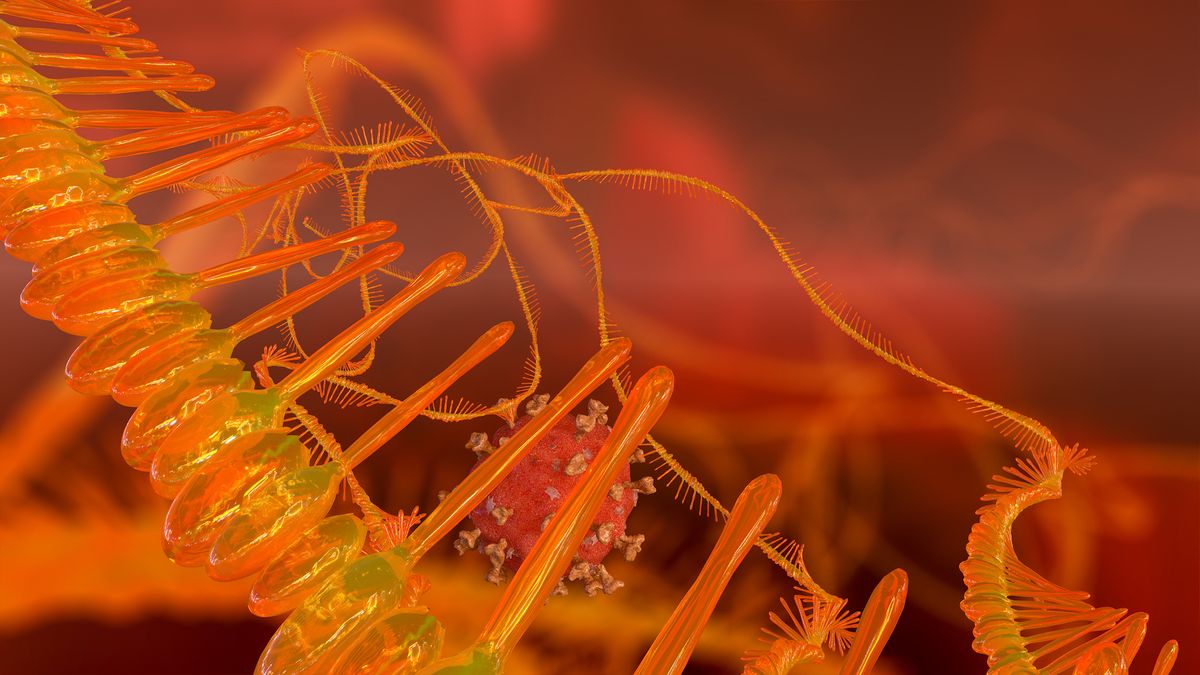
The Pfizer-BioNtech and Moderna COVID-19 vaccines will likely provide protection against the coronavirus for years if it doesn't evolve significantly, a small new study suggests.
As a massive vaccination effort continues to play out across the globe, there is still a question about how protective COVID-19 vaccines will be in the long term and whether booster shots will be necessary. Some vaccines for other viruses, such as influenza, provide only fleeting protection and need to be renewed every year, but others — such as the MMR vaccine for measles, mumps and rubella — confer lifelong protection.
The level of protection depends on how much and how quickly the virus evolves, as well as on how robust different types of vaccines are in spurring a lasting immune response. The Pfizer-BioNTech and Moderna vaccines both use a relatively novel platform known as messenger RNA (mRNA) to train the immune system to fight SARS-CoV-2, the virus that causes COVID-19, Live Science previously reported.
Related: Quick guide: COVID-19 vaccines in use and how they work
While mRNA vaccines have greatly exceeded experts' expectations and have shown high efficacy in protecting people from SARS-CoV-2, including its currently circulating variants, how long this protection will last hasn't been clear.
To figure this out, a group of researchers recruited 41 participants who received two doses of the Pfizer-BioNTech vaccine; eight had previously been infected with SARS-CoV-2. The researchers collected blood samples at the start of the study and then three, four, five, seven and 15 weeks after the participants received their first dose of the vaccine.
Consistent with previous studies, the researchers found that the mRNA vaccine induced strong antibody responses and that those responses were even stronger in people who had recovered from a mild SARS-CoV-2 infection prior to being vaccinated.
The team also collected lymph node samples across this same time span from 14 people, none of whom had previously been infected with SARS-CoV-2. In response to infections and vaccinations, fleeting molecular structures known as "germinal centers" form inside the lymph nodes, the glands that hold immune system cells and typically swell in response to an infection.
In people who are infected with SARS-CoV-2, these structures form in the lymph nodes of the lungs, which are difficult to access, whereas vaccines typically spur their production in the armpits, which is more easily accessible.
"You can think of them as our boot camps for the immune cells," said senior author Ali Ellebedy, an immunologist at the Washington University School of Medicine in St. Louis. The structures train a type of immune cell known as B cells over weeks and months to bind better to a pathogen — in this case, SARS-CoV-2.
The process creates highly trained immune cells, some of which are memory cells that will remember the virus in the long-term.
Not much is known about how long these "boot camps" last inside the lymph nodes in humans; animal studies have shown that they typically last only a few weeks, Ellebedy said.
But in the new study, Ellebedy and his team found something surprising: In most of the participants who received the vaccine, their germinal centers continued to be active, training these robust immune cells for at least 15 weeks after the first dose.
'Very promising' protection
Because this germinal-center response lasted for months, it likely produced many memory cells that will last for years; and some of these memory cells will likely establish themselves inside bone marrow and produce lifelong antibodies, Ellebedy told Live Science. That's "very promising" but doesn't necessarily mean people won't need booster shots, he said.
Rather, the need for booster shots will depend on how much the virus evolves and whether the cells produced by the germinal centers are robust enough to handle significantly different variants, he added. In addition, not everyone generates the same robust immune response; some people, such as those with suppressed immune systems, will likely need booster shots, he said.
"This study, like others before it, confirms that the vaccines are eliciting the appropriate reaction from the immune system and that durable immunity is being created," said Dr. Amesh Adalja, an infectious-diseases specialist and a senior scholar at the Johns Hopkins Center for Health Security in Baltimore.
Adalja, who was not involved in the new study, agrees that it's too soon to discuss whether we will need booster shots. "If a large proportion of the fully vaccinated are contracting breakthrough infections that land them in the hospital, that is the threshold for booster vaccinations," he told Live Science in an email.
Still, this is the first study to provide direct evidence that the germinal-center response is persistent in humans after vaccination. Although the authors didn't look at people who had received the Moderna vaccine, they think the response will likely be similar, because it's also an mRNA vaccine that showed a comparable efficacy, Ellebedy said. However, more research will be needed to see the duration of the germinal-center response from the Johnson & Johnson vaccine, because it uses a different platform (rather than mRNA), he said.
Now, Ellebedy and his team hope to continue monitoring these cells to see whether they migrate and settle permanently in bone marrow. In other words, it's still unclear whether these immune cells will "become our life partners, basically helping us for the rest of our lives" or if we will eventually need booster vaccines to make some better fighters.
The findings were published online June 28 in the journal Nature.
Originally published on Live Science.
Article From & Read More ( Pfizer and Moderna vaccines may provide years of protection from COVID-19 - Livescience.com )https://ift.tt/3AbF67p
Business
Bagikan Berita Ini















0 Response to "Pfizer and Moderna vaccines may provide years of protection from COVID-19 - Livescience.com"
Post a Comment